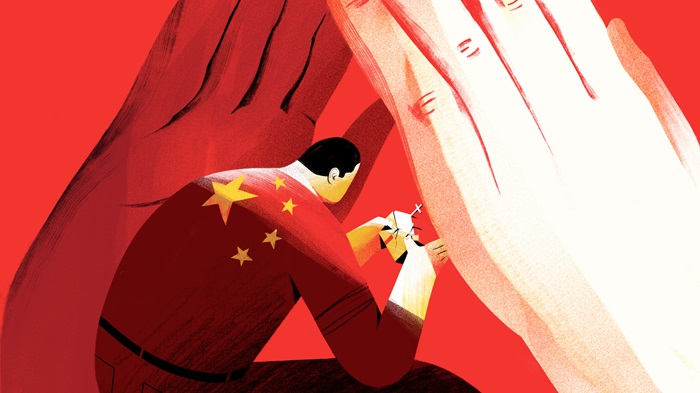CHINA CRACKS DOWN – AGAIN

Image by: Sara Wong
- The [Chinese] government is removing crosses from their steeples and replacing them with the national flag.
- Inside, the crosses are being replaced with pictures of President Xi.
- Congregations must sing patriotic songs in worship.
- Parents can’t bring their children to church.
CHINA CRACKS DOWN – AGAIN
By: Mark Galli
The tanks don’t always stop in China, as they did when the world watched a lone, brave man stand in Tiananmen Square and face down tanks designed to quell opposition to the government.
Few were watching in 2016 when the Reverend Li Jiangong and Ding Cuimei, his wife, stood before a bulldozer ordered by the government to demolish their church.
“Bury them alive for me,” an angry member of the demolition team reportedly said.
The bulldozer did. Li managed to scratch his way out. But his wife didn’t make it.
That turned out to be a step too far even for the Chinese government at the time, which soon hauled the demolition team in for questioning. But the deed was done—and whether politically intentional or not, it is a symbol of a brutal repression of the Chinese church that is only gaining momentum.
Since the Communist takeover, the church has always been subject to repression by authorities. But slowly since 1982, the government had been giving the church space to breathe. As late as the spring of 2011, Chinese officials were saying publicly that “religion is good for development,” according to a 2012 report in Foreign Policy. The government donated land, built churches, and authorized research on positive Christian contributions to society.
Under the current administration of President Xi Jinping, however, the government is tearing down some churches (like the 50,000-member Golden Lampstand Church in Shanxi Province in January) and closing others (most notably, Zion Church, Beijing’s largest house church). The Chinese government is working furiously to recreate the church in its image. Regulations announced last year formalized policy that has, in practice, been in effect for some years now: Religious leaders are required to “conduct religious activities in the Chinese context, practice core socialist values, carry forward the fine traditions of the Chinese nation, and actively explore religious thought which conforms to the reality in China.”
So, the government is removing crosses from their steeples and replacing them with the national flag; inside, the crosses are being replaced with pictures of President Xi. Congregations must sing patriot songs in worship. Parents can’t bring their children to church.
While other religious believers are also being squeezed into the government’s mold, and the persecution is just one part of Xi’s consolidation of power, we naturally have a special concern for our brothers and sisters in the faith. It’s time for us to do something for them, to engage in the one political activity for which we are especially equipped.
We can and should write to representatives and other officials on behalf of Chinese Christians. And donate to international religious freedom organizations. But God has given us one clear, unparalleled action to take when persecution occurs: Pray.
The Scottish theologian T. F. Torrance put it this way in his commentary on Revelation: “The prayers of the saints and the fire of God move the whole course of the world. They are the most potent, most disturbing, most revolutionary, most terrifying powers that the world knows. … All history moves at the impulse of prayer. The real initiative is not held by the riders on the white, red, black, and pale horses, but by the saints under the altar, by the prayers of the saints and the fire of God.”
Eugene Peterson, in Reversed Thunder, knows this sounds crazy to most Christians. So some “desert the place of worship with the best of motives, in order to do something about the world’s condition.” Others “turn [worship] into a platform for launching good works, shooting rockets of righteousness behind enemy lines. Attention is subverted from what God is doing to what we are doing.” But according to Peterson, God’s repeated assurance is this: “Nothing that we do has more effect in heaven or on earth.”
Of course, we don’t have to pit social action against prayer, as if they are mutually exclusive ways of fighting injustice. They come together in a unique way in prayer vigils, one of the most moving and effective strategies of the pro-life movement, the civil rights movement, and other calls for justice. What if Christians started gathering at Chinese consulates, state capitals, and the White House, vowing to stand and pray together? And beyond such dramatic gestures, what if we prayed individually and in small groups, regularly and with fervent hope, for our brothers and sisters across the Pacific—might we see once more “the fire of God move the whole course of the world”?
Mark Galli is editor-in-chief of Christianity Today.
